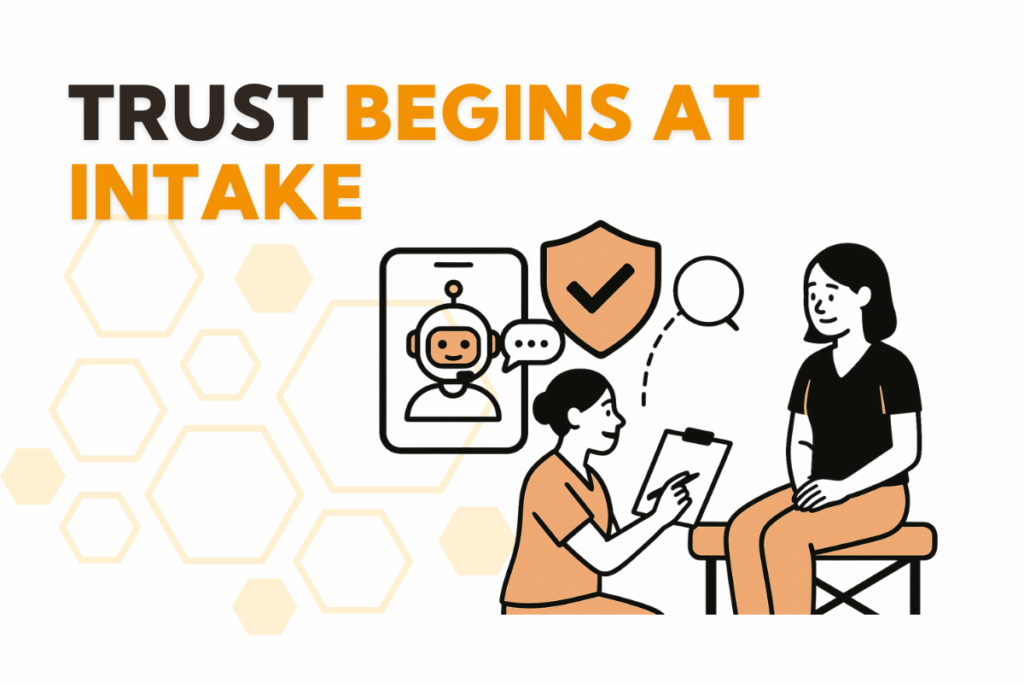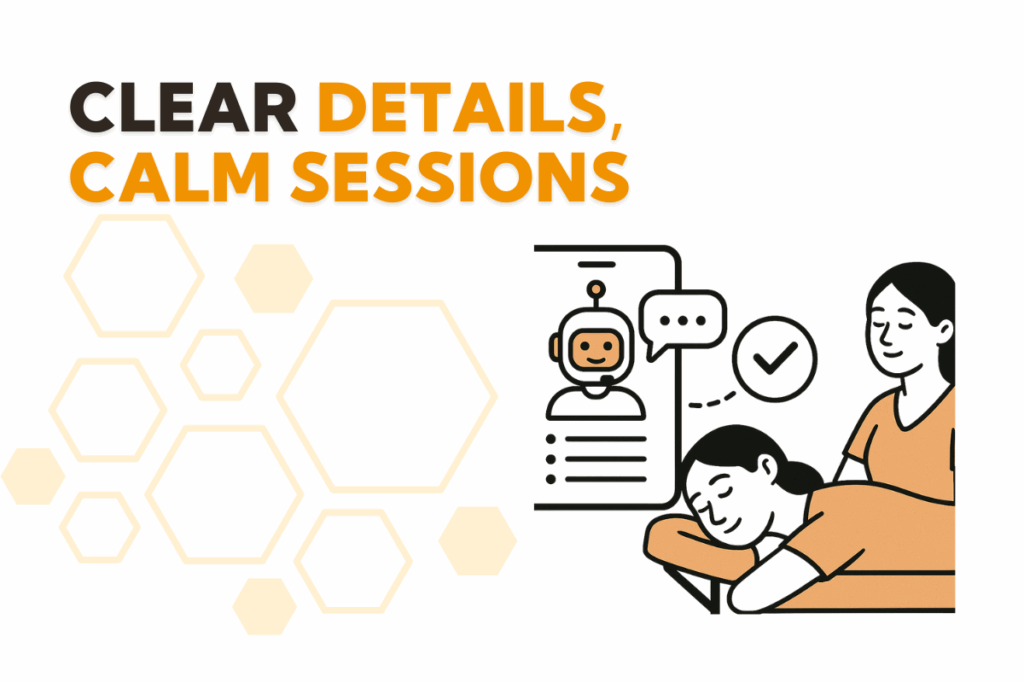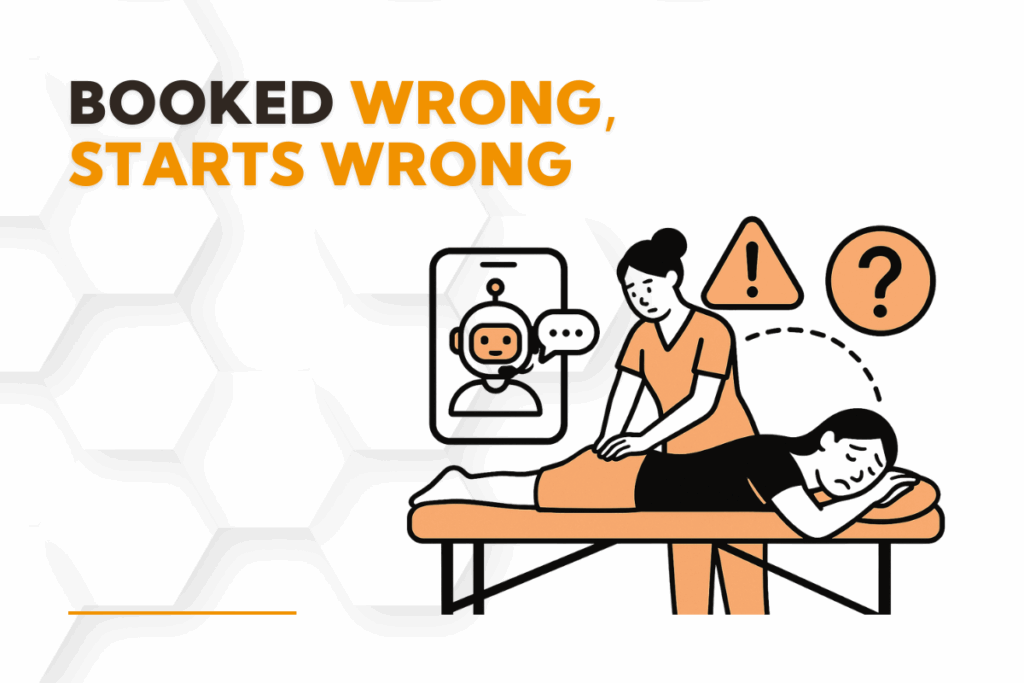Bot booking miscommunication can disrupt first sessions, confuse clients, and damage trust—before you even say hello.
Even One Mistake Can Undermine Trust
You’ve got the room ready, music set, and chart reviewed. A new client walks in and says they booked a prenatal massage. You don’t offer that. Or they expected deep tissue, but the bot missed their recent surgery.
That’s a bot booking miscommunication. It might seem small, but it can instantly shift the tone of the session, put the therapist on the defensive, and make the client feel uncertain or misled. These errors are becoming a common frustration among clinic owners who rely on automation to simplify intake.
When automated booking fails to communicate the right details, it doesn’t just cause confusion—it puts client safety, professional credibility, and your entire clinic’s reputation at risk.
What Leads to Bot Booking Miscommunication?
Missing or Incomplete Intake Questions
If the bot doesn’t ask about injuries, goals, pressure preferences, or past medical issues, therapists walk in blind—and that’s dangerous.
Confusing Service Descriptions
When bots use vague terms like “custom massage” or “relaxation,” clients may book something entirely different than what they had in mind.
Generic Error Responses
Bots that don’t understand client questions and respond with “I didn’t catch that” can feel robotic and unhelpful, causing frustration.
No Way to Reach a Human
If there’s no easy way to reach someone real when booking goes sideways, clients often show up with the wrong expectations—or not at all.
These problems are all rooted in bot booking miscommunication, and they’re more common than many clinic owners realize.
Real-World Examples from Massage Clinics
“A client booked a prenatal massage, but our system didn’t have prenatal listed as a contraindication. I had to cancel the session last minute.”
— Jenna, RMT, Edmonton
“Our chatbot showed outdated services. A client came in expecting a sports massage we stopped offering months ago.”
— Carlos, Clinic Owner, Toronto
These stories are direct results of bot booking miscommunication that could have been avoided with a more intentional intake process.

How Bot Booking Miscommunication Impacts Clinics
More Time Spent Fixing Errors
Every time a client walks in misinformed, your team has to do the emotional and logistical work of correcting it—often in the moment.
Weakened Trust with Clients
Clients trust you with their health. If they feel the clinic isn’t clear or reliable, that trust erodes fast—and it’s hard to earn back.
Disruption to the Therapist’s Flow
Your team relies on clear intake to deliver great care. If sessions start with confusion, it throws off focus, presence, and even outcomes.
Steps to Prevent Bot Booking Miscommunication
1. Use Custom Online Intake Forms
Ensure every booking captures essential client information. Choose tools that let you create condition-specific or service-specific questions.
Check out online intake form tools for massage clinics to get started.
2. Clarify Service Names and Descriptions
Avoid vague terms. Clearly list what’s included, what’s not, and what’s required before booking. Consider adding pressure level expectations and contraindications.
3. Train Your Bot to Respond Better
Set up fallback messages that feel warm and human. For example:
“I’m not sure about that, but someone from our team can help clarify. Can I pass along your info?”
This softens the gap and avoids the cold feeling that often accompanies bot booking miscommunication.
4. Add a Pre-Session Review Step
Have your team quickly review new bookings and intake responses before the appointment. This prevents in-session surprises and improves care quality. Use automated reporting and analytics to spot mismatches early.
5. Include a Human Fallback Option
Always give clients a path to speak with someone directly. Whether through text, email, or phone, this builds trust and catches errors early.

When Automation Works With You, Not Against You
The goal isn’t to throw out automation—it’s to guide it with the insight of someone who understands client care. Bot booking miscommunication happens when software doesn’t reflect the nuance of your services, your people, and your standards.
But when bots are well-trained, intake forms are specific, and your team reviews the right info before sessions, the system becomes your ally—not a liability.
You’ve worked too hard building client trust to let a booking bot undermine it.
FAQs
Watch for repeated client confusion, service mismatches, or therapists having to adjust sessions last minute. These are signs your intake or booking flow needs an update.
At a minimum: goals, pressure preference, injury or condition history, and any recent surgeries. Always confirm service type and duration.
Yes, if done intentionally. Use automation to streamline admin work, not replace human care. Offer handoff points to staff where needed.
Look for systems with custom online intake forms, automated reporting, and easy human handoff features. These tools help prevent bot booking miscommunication and create a smoother client experience.


